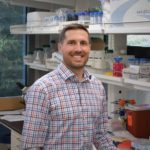The Gries lab was established in 2021 with research interests spanning bacterial pathogenesis and innate immunity. The primary focus of the lab is on the molecular mechanisms of Staphylococcus aureus biofilm formation and medical implant-associated infections. The overarching goal of this work is to further our understanding of biofilm infection development and associated innate immune responses with the long-term goal of developing novel strategies to prevent and treat device-associated S. aureus infections. To do this, the laboratory utilizes a variety of cutting-edge instrumentation and infection models to examine various aspects of biofilm formation, immune cell activity, and bacterial physiology and biochemistry.
Dr. Gries also has microbiology and infectious disease educational roles in the Online Master of Science in Microbiology – Immunology program, as well as the University of Colorado School of Medicine at CSU.
research project
Potassium transport in S. aureus
A key aspect of S. aureus pathogenesis is its ability to adapt to environmental changes within and outside the host. Many of these responses depend on mechanisms of potassium transport. A goal of this project is to identify and characterize the diverse potassium transport systems in S. aureus and their role in mediating cellular biochemical homeostasis, antimicrobial resistance, and pathogenesis.
research project
Neutrophil migration during infection
Neutrophils are the first line of cellular immune defense against invading bacterial pathogens; their coordinated recruitment and activity are essential in preventing and eliminating infection. However, biofilm products can alter immune responses to promote infection. Here we examine neutrophil chemotactic responses to S. aureus biofilms and test ways to stimulate neutrophil anti-biofilm activity.
research project
S. aureus biofilm development
The biofilm mode of growth is regulated by a complex network of genetic factors responding to various environmental cues. In serum, host molecules induce a robust and complex S. aureus biofilm architecture which poses a physical barrier to immune cell infiltration and phagocytosis. This project examines the serum molecules and response to those molecules that promotes S. aureus biofilm formation.
Publications
CXCR2 perturbation promotes Staphylococcus aureus implant-associated infection.
Akaraphanth M, Nordgren TM, Gries CM. J Med Microbiol. 2024 Apr;73(4). doi: 10.1099/jmm.0.001821. PMID: 38567642
Beyond Homeostasis: Potassium and Pathogenesis during Bacterial Infections.
Do EA, Gries CM. Infect Immun. 2021 Jun 16;89(7):e0076620. doi: 10.1128/IAI.00766-20. Epub 2021 Jun 16. PMID: 33875474
Intravital Multiphoton Examination of Implant-Associated Staphylococcus aureus Biofilm Infection.
Gries CM, Rivas Z, Chen J, Lo DD. Front Cell Infect Microbiol. 2020 Oct 15;10:574092. doi: 10.3389/fcimb.2020.574092. eCollection 2020. PMID: 33178628
Lactate production by Staphylococcus aureus biofilm inhibits HDAC11 to reprogramme the host immune response during persistent infection.
Heim CE, Bosch ME, Yamada KJ, Aldrich AL, Chaudhari SS, Klinkebiel D, Gries CM, Alqarzaee AA, Li Y, Thomas VC, Seto E, Karpf AR, Kielian T. Nat Microbiol. 2020 Oct;5(10):1271-1284. doi: 10.1038/s41564-020-0756-3. Epub 2020 Jul 13. PMID: 32661313
The autoimmune susceptibility gene, PTPN2, restricts expansion of a novel mouse adherent-invasive E. coli.
Shawki A, Ramirez R, Spalinger MR, Ruegger PM, Sayoc-Becerra A, Santos AN, Chatterjee P, Canale V, Mitchell JD, Macbeth JC, Gries CM, Tremblay ML, Hsiao A, Borneman J, McCole DF. Gut Microbes. 2020 Nov 1;11(6):1547-1566. doi: 10.1080/19490976.2020.1775538. Epub 2020 Jun 26. PMID: 32586195
more publications
People
Mike Akaraphanth
Research Assistant
Medical Student - CU Anschutz, Fort Collins
contact information
Office: Research Innovation Center (RIC) room D113
Labs: Research Innovation Center (RIC) rooms D139 & D143
(970) 491-8329
[email protected]



